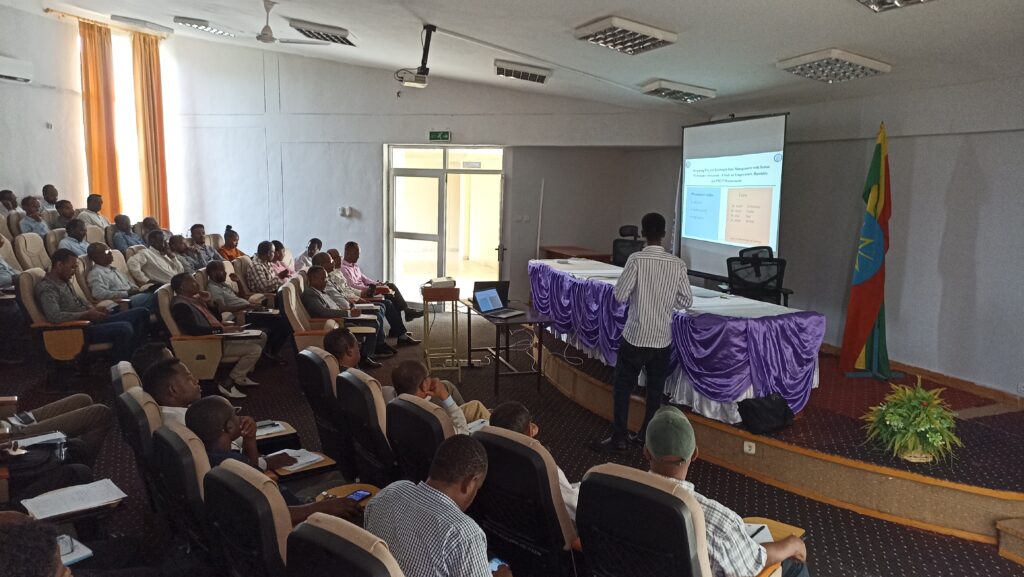On October 4, 2024, seven project teams gave presentations on their student science plans to Arba Minch University (AMU) management, deans and research directors. We were invited as first agenda point of the Research and Development Committee (RDC) meeting.

I coordinate the 2024/2025 student science pilot project. It is hosted by the office of the Vice President of Academic Affairs (Dr. Alemayehu Chufamo). In June, we distributed a call for university staff to submit a plan on turning part of a course into a research project. Seven teams reacted to the call, submitted plans, and gave a short presentation of their plans to the RDC. After these presentations, there was a one-hour discussion on possibilities and challenges for student science.
The projects
Over the past five years, I have applied student science for air quality research. The pilot project will be a test of the hypothesis that the same can be done in other fields as well. Seven project teams aim to turn one or more undergraduate courses into a research project. The topics cover different fields (engineering, natural science, social science). Combined, they will provide good insight into what is possible (and what not) with student science. Below, I give a short description of each of the projects.
1. Flood modelling of kulfo river using hec-ras
- Course: Software in Hydraulic Engineering
- Students: Year four students of Hydraulic and Water Resources Engineering
Bereket Dora and Muluneh Legesse plan to turn part of the course Software in Hydraulic Engineering into data collection and the use of this data for flood modelling with the HEC-RAS model. Students will be trained in data collection, go to the river Kulfo to collect data, and use this data as model input.
2. Investigating the quantity of water loss and its impact on water demand coverage: the case of AMU main campus
- Courses: (1) Urban Water Supply Engineering, (2) Water Supply and Treatment
- Students: Year four students of Water Supply and Environmental Engineering, year four students of Hydraulic and Water Resources Engineering
Deberge Beyene, Kinfe Bereda and Dr. Zelalem Abera will use part of two water supply courses to let students study water loss and its effects on water coverage at Arba Minch University main campus. Parts of the courses deal with water supply systems and water loss. Students will apply this knowledge to assess the water supply system and measure water loss on campus.
3. The affirmative action for women in ethiopian higher education institutions: the case of AMU
- Course: Sociology of gender
- Students: Year four of Sociology
Dr. Endrias Liranso will use part of the course Sociology of gender to let students study the application and effects of affirmative action for women at Arba Minch University. The focus will be on female staff and students at AMU Chamo campus. Students will design questionnaires, conduct interviews and focus group discussions, and analyze the data qualitatively and quantitatively.
4. Assessment of air quality in selected chemistry laboratories and development of cost-effective portable activated carbon based lab air purifier
- Course: Thermal and mass transfer unit operations
- Students: Year four of Industrial Chemistry
Firew Deneke and Seguye Shamena will use part of the course Thermal and mass transfer unit operations to let students study the air quality during lab experiments, evaluate current air filtration efficiencies, and synthesize and characterize activated carbon.
5. Investigation of the Effects of Different Growth Regulators on Micropropagation of Potato (Solanum tuberosum) via Tissue Culture Techniques
- Course: Senior year project Biotechnology track
- Students: Final year students of Biotechnology
Kidist Ali, Yonas Syraji, Dawit Albene and Dr. Ashenafi Hailu will use a senior year project to let students study the effects of different growth regulators on a local potato culture. Students will collect samples, prepare them in the lab, expose them to growth regulators and monitor the growth.
6. Determination of harmonic pollution indices and load unbalacing factor for transformers supplying non-linear loads
- Course: Power Electronics
- Students: Year four students of Electrical and Computer Engineering.
Dr. Yalisho Girma, Andinet Anjamo and Zeleke Ginto will use part of the course Power Electronics to let students study the effects of unbalanced power loads on the AMU main campus power supply. Students will collect data during moments of expected high (and variable) load.
7. Integrating Practical Training in Data Collection, Analysis, and Interpretation with Sensor
Performance Assessment : A Case Study on Temperature, Humidity, and PM2.5
Measurements
- Courses: (1) Hydrometry and Meteorological Observations, (2) Atmospheric Chemistry and Air Quality, (3) Data Analysis in Meteorology and Hydrology
- Students: Year three students of Meteorology and Hydrology
Israel Gebresilassie, Yared Godine, Awel Haji and Dr. Abebe Kebede will use parts of three courses of Meteorology and Hydrology (MH) for data collection and data analysis of low-cost air quality sensors. As part of a project to set up a low-cost measurement network, sensor systems will be installed across Arba Minch. Students of MH will collect and analyze data from these sensor systems, with a special focus on the meteorological parameters. They will validate the relative humidity and temperature measurements with reference instruments, evaluate variation of meteorology across town (and the representativeness of a single meteorological station), and study the relation between the meteorological parameters and the PM2.5 measurements.

